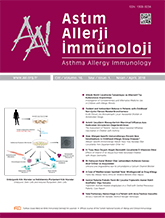


Objective: Complementary and alternative medicine methods are being used in many societies due to lack of adequate response to medical treatment or feared possible side effects in chronic diseases requiring long-term treatment. The aim of this study was to investigate the use of complementary and alternative medicine methods in children with allergic rhinitis.
Materials and Methods: The study was planned as a cross-sectional study in children with allergic rhinitis between June-October 2015 at the Tepecik Training and Research Hospital. A data collection form consisting of 31 questions was used. These questions were posed to the mothers of the children with allergic rhinitis who had been followed up at least for three months at the pediatric allergy outpatient clinic.
Results: The study included 100 patients (77 boys, 23 girls). The median age of the patients was 13.3 years (min=4, max=17). Eightytwo percent of the patients had moderate/severe allergic rhinitis, 91% had persistent allergic rhinitis, and 63% had seasonal allergic rhinitis. Seventy-five percent of the patients were using more than one medication. Fourteen percent of the patients used complementary and alternative medicine methods. However, these treatments had been recommended to 36% of the patients. The patients who used and did not use complementary and alternative medicine methods were no different by means of age, severity of disease, duration of disease, multiple drug use, income of the family, place of residence, family type, and education level of mother and father (p>0.05). The most commonly recommended method was herbal treatments in 62.5% and the most commonly used method also was herbal treatments in 77.7%. The most commonly used methods were black seed/black seed oil, black radish/honey and local application of tea for the treatment of conjunctivitis.
Conclusion: In our study, complementary and alternative medicine therapies were used in 14% of patients with allergic rhinitis and it was found that the most commonly used methods were black seed/ black seed oil, black radish/honey and tea for the treatment of conjunctivitis. The use of complementary and alternative medicine is not uncommon among children with allergic rhinitis although it is less frequent when compared to other chronic diseases. Keeping in mind that such therapies might have certain side effects, patients should be questioned about the use of these methods.